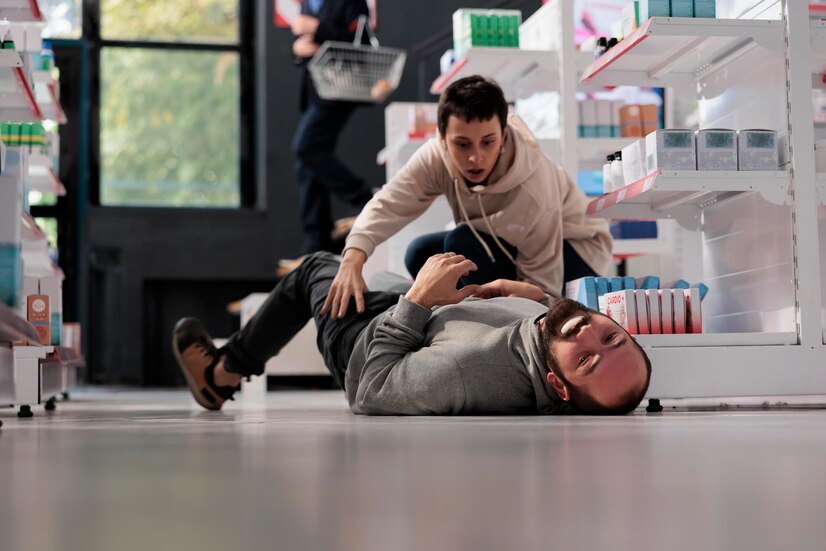
In Texas, accidents can happen anywhere, even in retail stores. If you find yourself injured due to a slip and fall, a falling object, or any other type of accident in a retail store, it’s important to know your rights. That’s where this ultimate guide comes in.
Our comprehensive guide will walk you through the process of winning a retail store accident lawsuit step by step, arming you with the knowledge you need to protect yourself and seek the compensation you deserve. We’ll provide valuable insights into the legal system in Texas, helping you navigate the complexities and pitfalls along the way.
From gathering evidence to hiring the right attorney, we’ll cover all aspects of your case and empower you to make informed decisions. We’ll also shed light on common defenses used by retail stores and how to counter them to strengthen your claim.
Don’t let a retail store accident leave you in financial distress. With our guide, you’ll be equipped to take on the legal battle and emerge victorious in your pursuit of justice.
When a retail store accident occurs, taking immediate action is crucial. Your first priority should be your safety and well-being. Seek medical attention for your injuries, regardless of their severity. Inform store management about the accident and ensure that an incident report is filed. It’s important to obtain a copy of this report for your records.
Preserving evidence is another critical step. Document the accident scene by taking photographs or videos, making note of any hazardous conditions that contributed to the accident. Collect contact information from witnesses who can provide statements supporting your version of events.
Additionally, it’s advisable to refrain from discussing the accident with store employees or insurance representatives without the presence of legal counsel. Anything you say could be used against you later in the legal proceedings. By taking these immediate steps, you’ll be setting a strong foundation for your retail store accident lawsuit.
One of the key elements in winning a retail store accident lawsuit is gathering compelling evidence to support your claim. The evidence you collect will help establish the negligence of the retail store and strengthen your case. Here are some important pieces of evidence to consider:
1. Photographs and videos: Capture the accident scene, any hazards or defects that contributed to the accident, and your injuries. These visual records can be powerful evidence in demonstrating the conditions that led to your injury.
2. Incident report: Obtain a copy of the incident report filed by the store management. This document will provide an official record of the accident and the store’s response.
3. Witness statements: Contact witnesses who observed the accident and obtain their statements. Their testimonies can provide crucial support for your claim.
4. Medical records: Gather all relevant medical records, including doctor’s notes, diagnostic tests, and treatment plans. These records will help establish the extent and impact of your injuries.
5. Surveillance footage: If the retail store has surveillance cameras, request a copy of the footage that captures the accident. This footage can provide objective evidence of the incident.
By meticulously gathering and preserving evidence, you’ll be able to present a strong case in court and increase your chances of winning the lawsuit.
Proving liability is a crucial aspect of winning a retail store accident lawsuit. In Texas, premises liability laws hold property owners responsible for maintaining a safe environment for visitors. To establish liability, you’ll need to demonstrate the following elements:
1. Duty of care: Show that the retail store owed you a duty of care to keep the premises safe for visitors.
2. Breach of duty: Prove that the retail store breached its duty of care by failing to maintain a safe environment or address known hazards.
3. Causation: Establish a direct link between the store’s negligence and your injuries. Demonstrate that the store’s actions or inactions directly caused your accident.
4. Damages: Provide evidence of the physical, emotional, and financial damages you have suffered as a result of the accident.
Successfully determining liability requires a thorough investigation and a strong understanding of premises liability laws. By working with an experienced attorney, you’ll have the guidance you need to establish liability and build a compelling case.

When seeking compensation in a retail store accident lawsuit, understanding how damages are calculated is essential. Damages can be categorized into two main types: economic and non-economic.
Economic damages are quantifiable losses that can be directly attributed to the accident. These include medical expenses, lost wages, property damage, and future medical costs. Calculating economic damages involves gathering receipts, invoices, pay stubs, and expert opinions to determine the financial impact of the accident.
Non-economic damages, on the other hand, are more subjective and aim to compensate for the physical and emotional pain and suffering caused by the accident. These damages can include loss of enjoyment of life, emotional distress, scarring, and loss of consortium. Calculating non-economic damages can be challenging, as they don’t have a clear monetary value. An attorney experienced in retail store accident cases can help assess the value of your non-economic damages based on similar cases and legal precedents.
By accurately assessing and calculating both economic and non-economic damages, you can present a comprehensive claim that reflects the true extent of your losses.
Navigating the legal complexities of a retail store accident lawsuit requires the expertise of a skilled attorney specializing in personal injury law. When selecting an attorney, consider the following factors:
1. Experience: Look for an attorney who has a proven track record of handling retail store accident cases and securing successful outcomes for their clients.
2. Expertise: Ensure that the attorney has in-depth knowledge of Texas premises liability laws and is familiar with the tactics commonly used by retail stores to defend against accident claims.
3. Resources: A well-equipped law firm with access to expert witnesses, investigators, and other resources can strengthen your case and increase your chances of success.
4. Communication: Choose an attorney who communicates effectively and keeps you informed throughout the legal process. They should be responsive to your questions and concerns.
During the initial consultation, discuss the attorney’s fee structure and any potential costs associated with your case. Many personal injury attorneys work on a contingency fee basis, meaning they only get paid if they win your case.
By hiring a skilled retail store accident attorney in Texas, you’ll have a legal advocate by your side who will fight for your rights and ensure you receive the compensation you deserve.
Understanding the legal process of a retail store accident lawsuit in Texas can help you navigate the system with confidence. While every case is unique, the following steps are typically involved:
1. Consultation and investigation: Meet with an attorney to discuss the details of your case. The attorney will investigate the accident, gather evidence, and assess the strength of your claim.
2. Demand letter and negotiations: Your attorney may send a demand letter to the retail store, outlining your injuries, damages, and a proposed settlement amount. Negotiations may take place to reach a fair settlement without going to court.
3. Filing a lawsuit: If a settlement cannot be reached, your attorney will file a lawsuit on your behalf. The retail store will be served with a summons and complaint, initiating the formal legal proceedings.
4. Discovery: Both parties exchange information and evidence through written requests, depositions, and interrogatories. The goal is to uncover any relevant facts and strengthen your case.
5. Pre-trial motions: Attorneys may file motions to resolve legal issues or seek a favorable ruling before the trial begins. These motions can impact the course and outcome of the lawsuit.
6. Trial: If your case goes to trial, both sides will present their arguments, evidence, and witnesses to a judge or jury. The judge or jury will determine liability and assess damages.
7. Verdict and appeal: If a verdict is reached, the judge or jury will announce their decision. If you win, you may be awarded compensation. Either party can choose to appeal the verdict if they believe legal errors occurred during the trial.
Understanding the legal process can help you prepare for what lies ahead and make informed decisions at each stage of your retail store accident lawsuit.

Retail stores often employ various defenses to protect themselves against liability in accident cases. It’s important to be aware of these defenses and how to counter them to strengthen your claim. Some common defenses used by retail stores include:
1. Lack of notice: The store may argue that they were not aware, or could not have reasonably been aware, of the hazardous condition that caused your accident. To counter this defense, you’ll need to demonstrate that the store should have known about and addressed the dangerous condition.
2. Comparative negligence: The store may argue that your own negligence contributed to the accident. Texas follows a modified comparative negligence rule, which means your compensation can be reduced if you are found partially at fault. To counter this defense, you’ll need to show that the store’s negligence outweighs any potential negligence on your part.
3. Assumption of risk: The store may claim that you willingly exposed yourself to the risk of injury by entering the premises. However, this defense may not apply if the store failed to warn you about a known danger or if the dangerous condition was hidden.
By understanding these common defenses and working with an experienced attorney, you can effectively counter them and strengthen your position in the lawsuit.
As your retail store accident lawsuit progresses, you’ll need to decide whether to pursue a settlement or take your case to trial. Both options have their advantages and considerations.
Settlements can offer a quicker resolution and provide you with compensation without the uncertainty of a trial. They can save you time, money, and the emotional toll of a lengthy legal battle. However, settlements may result in lower compensation compared to what you could potentially receive through a successful trial.
Taking your case to trial allows you to present your case to a judge or jury and potentially receive a higher verdict. However, trials can be time-consuming, costly, and there’s always the risk of an unfavorable outcome.
When weighing your options, consult with your attorney, who can provide guidance based on the specific circumstances of your case. They will help you assess the strengths and weaknesses of your claim and determine the best course of action to achieve a successful outcome.
After being involved in a retail store accident, one of the most crucial decisions you will have to make is whether to settle or go to trial. This decision will have a significant impact on the outcome of your case and your future wellbeing. It is essential to weigh the pros and cons of each option and make an informed decision based on your specific circumstances.
When deciding whether to settle or go to trial for your retail store accident, there are several factors that you should carefully consider. These factors include the strength of your case, the potential financial award, the time and stress involved in going to trial, and your personal circumstances.
Settling a retail store accident claim can often provide a quicker resolution to your case, allowing you to receive compensation sooner rather than later. It also avoids the uncertainty and risks associated with going to trial. Additionally, settling can save you time and money on legal fees. However, it is important to assess the settlement offer carefully and ensure that it adequately covers your medical expenses, lost wages, and pain and suffering. It is crucial to consult with an experienced personal injury attorney who can help you negotiate a fair settlement.
Going to trial for a retail store accident can potentially result in a higher financial award, as it allows you to present your case to a judge or jury. It also provides an opportunity for you to have your story heard and seek justice. However, going to trial can be a lengthy and stressful process, with no guarantee of a favorable outcome. It requires significant time, effort, and financial resources. It is important to carefully evaluate the strength of your case and consult with an experienced personal injury attorney to determine if going to trial is the best course of action for you.
Assessing the strength of your case is crucial when deciding whether to settle or go to trial for your retail store accident. Consider factors such as the evidence you have gathered, witness statements, medical records, and any expert testimony that may support your claim. Consulting with a personal injury attorney who specializes in retail store accidents can help you evaluate the strength of your case and determine the best course of action.
Expert testimony can play a crucial role in retail store accident cases. Experts, such as medical professionals or accident reconstruction specialists, can provide objective opinions and analysis that can strengthen your case. They can provide insights and evidence that may not be readily apparent to a judge or jury. Consulting with a personal injury attorney who has access to reputable experts can greatly enhance the credibility and strength of your case.
In addition to settling or going to trial, there are alternative dispute resolution options available for retail store accident cases. These options include mediation and arbitration, which can provide a more informal and less adversarial process for resolving your claim. Mediation involves a neutral third party who helps facilitate negotiations between you and the responsible party, while arbitration involves a neutral third party who reviews the evidence and makes a binding decision. Exploring these options with the guidance of a personal injury attorney can help you determine if they are suitable for your case.

Texas, with its bustling retail industry, sees its fair share of accidents in stores. Understanding the common types of accidents that can occur is crucial in building a strong case. Slip and falls, falling objects, inadequate security, and poorly maintained premises are some of the common causes of retail store accidents.
When it comes to retail store accidents, premises liability laws come into play. These laws hold property owners responsible for maintaining a safe environment for visitors. However, establishing liability can be complex, as it requires proving that the property owner was negligent or failed to fulfill their duty of care.
To build a solid case, it’s important to gather evidence and establish that the accident was caused by the negligence of the retail store. This includes documenting the scene of the accident, taking photographs, collecting witness statements, and obtaining any relevant surveillance footage. By understanding the nature of retail store accidents and the legal framework surrounding them, you’ll be better prepared to navigate the legal process.